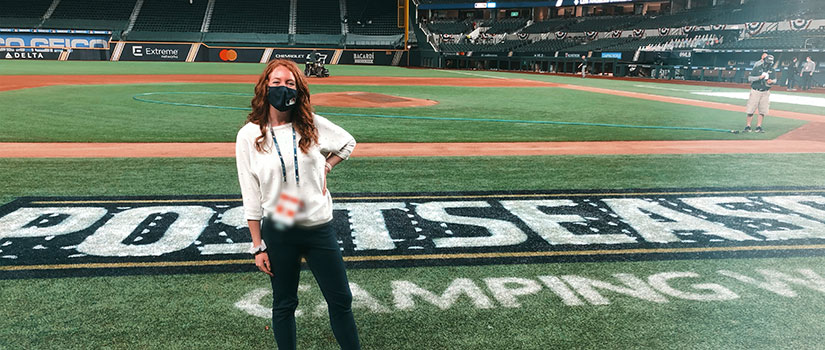Less than two years after graduating from the University of South Carolina, Madison Benner was working the 2019 World Series as a security and ballpark operations coordinator for Major League Baseball. Her career was taking off, but five months later she faced unprecedented challenges as the world of professional sport worked to respond to a global crisis.
Benner, who graduated magna cum laude with a B.S. in sport and entertainment management from South Carolina, has worked through the COVID-19 pandemic from the beginning. She spent the 2020 postseason in the MLB bubble in Arlington, Texas, working her second World Series in an unprecedented situation.
When the world changed
Benner was at Spring Training in Arizona when the virus put everything on hold. She went from working a fan-filled qualifier for the World Baseball Classic to finding herself working from home in uncharted territory.
“It was pretty crazy,” she says. “For all of us, it was just learning as we go.”
MLB found a way to keep America’s favorite pastime going — creating a shortened regular season without fans at the ballparks. But the challenge to play ball during a pandemic was just getting started.
“What we were doing during the regular season was working. But we couldn't risk any positive cases during postseason,” Benner says. “We had to figure out a way to eliminate that risk.”
MLB decided the best way to mitigate risk was the bubble system. “MLB bubbles” were established in Arlington and San Diego. Players and essential employees were tested daily and allowed no contact with the outside world. The decision was made shortly after Labor Day, and as Benner puts it, "We hit the ground running from there."
Life in the bubble
Benner, who is based in New York, was part of MLB’s essential crew and left her normal life behind to spend 40 days in Arlington. She lived in a hotel room and the hotel and Globe Life Field were the only places she could go. Meals and any other needed items were brought in using a drop zone delivery system, avoiding any contact with people from outside.
Her tasks began with working alongside Texas Rangers staff and consultants to plan how to assign space in the ballpark for this completely new system. She and her colleagues faced challenge after unprecedented challenge, and the experience formed a tight-knit team of sport management professionals who were all figuring things out on the fly.
"It was a montage of groups," she says. "It was like the first week of college. Most of us didn’t know each other when we arrived, but we made it work and became very close."
Their success was a playbook for sport management all over the world. The testing, the isolation, the limited fan access, the strategic operations decisions — it all came together for an exciting postseason in which MLB achieved the biggest goal. They kept the focus on baseball, not the pandemic. When asked to remember October 2020, baseball fans will talk about the Rays’ improbable run and the Dodgers’ championship win after a long string of near misses.
“Knowing I was part of this, that I helped pull it off, was a pretty good feeling,” Benner says.
What comes next
With the pandemic postseason behind them, Benner and her coworkers are focused on the 2021 season and are ready for another inning of battling the odds.
"We've been told to stay flexible," she says. "Projects just come out of the blue, because we're all trying to figure out what this season will look like."
In a normal year, Benner’s role includes managing the field in the postseason and coordinating with teams throughout the year, sharing information and best practices and being a resource for them. If all goes as scheduled, she will work the All-Star Game in Atlanta this summer, and will lead a “green team,” focusing on one of her favorite parts of the job: sustainability.
Benner creates content for the MLB Green website and leads teams of volunteers who handle tasks like collecting recyclables at MLB events.
"It's like my baby. I love it,” she says of the site and the work. "It's definitely carried over to my personal life."
Gamecock lessons
COVID-19 was a curve ball like none other, and it could have very well struck out an entire season of sports. But having well-prepared professionals like Benner at the plate made all the difference, and that preparation started at the University of South Carolina’s Department of Sport and Entertainment Management.
“I think the biggest part of what made me ready was the internships in college,” she says. “The classroom experience was useful too, but being hands-on and learning in a real-world environment was key to everything.”
It is easy to see how fast Benner has risen in the sport management world when you see the resume she put together while still a student. She worked the Masters Tournament and Firefly Music Festival. She interned with minor league baseball’s Wilmington Blue Rocks. In her final internship for college credit, she was a venue management intern for the NBA’s Portland Trail Blazers.
“That was probably the best experience I could have had,” she says. “My managers just wanted me to learn and exposed me to so much.”
While in the lengthy process of applying and interviewing for her current job, Benner gained still more experience in entertainment management as a production assistant for the Hollywood Bowl in Los Angeles. She accepted the job knowing she would have to move across the country and says that decision is an instructive one for students hoping to pursue a career in sport and entertainment management.
“I took the job with no plans on where to live and I just figured it out. Making it work with what you have is better than shying away from an opportunity because it doesn't seem practical,” she says. “When you see an opportunity, you have to swing for it.”
